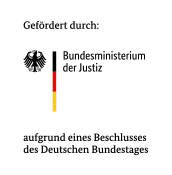Commemorating the International Day Against Homophobia, Biphobia and Transphobia 2022 in a Webtalk with women´s activists from the Masakhane project and the GIZ Working Group Southern Africa and Lesotho.

May 17 is the International Day Against Homophobia, Biphobia and Transphobia. On this day, back in 1990, the World Health Organisation declassified “homosexuality” as a mental disorder. The Hirschfeld-Eddy-Foundation together with the GIZ Working Group on Gender/HIV/Wellbeing in South Africa, Lesotho and eSwatini commemorated this important day by hosting a virtual event with speakers and activists of the LGBTQIA+ community of South Africa and Lesotho as well as a broad audience from GIZ colleagues.
Botho Maruatona was the coordinator of the Masakhane project in South Africa, the biggest BMZ funded project for lesbian women and trans persons, which came to an end last year. The project aimed at ensuring the liberty of queer women in different parts of the African continent. Botho mentioned that the health sector is heteronormative and limited in definitions of sexuality in many African countries. It is therefore important to support people to identify their sexual (health) rights.
Neo Kabi was the coordinator of the Masakhane project in Lesotho. She highlighted the lack of a legal framework for queer persons in Lesotho. Contrary to South Africa there is no protection of women who tested positive on HIV. In Lesotho a common practice is to sterilize these women without letting them know. She therefore advocates for a legal framework in Lesotho for the protection of LGBTQIA+ persons and the acknowledgement of Do No Harm. Besides the legal conditions, a major problem is the discriminatory society, and that queer people often face not only psychological but also physical violence in their everyday life.
Some GIZ colleagues identify themselves not only as members of the LGBTQIA+ community but also as so-called allies. In general, Botho acknowledges those persons, but she also reminded them that allyship is about learning and unlearning, not about speaking for the community. One topic that came up from the participants was about gender neutral salutations, the use of they/ them and avoiding Mr, Mrs, chairman/chairlady, etc. The speakers encouraged the working group to consider giving language services a bit of a nudge to staff members, as some folks are still stuck in old ways and need a little nudge to relearn. On the International Language Services page, there is a gender-writing inclusive style information on this topic.
To conclude Neo expressed her wish for more honest conversations with the LGBTQIA+ community. Cornelia Sperling, a supporter from the German Association of Lesbian and Gay persons (LSVD) and a lesbian* activist herself, agreed and wrapped up by encouraging the audience to listening to the queer persons and to reflect their own behaviour every day. As Ulrich Bormann, Portfolio Manager of GIZ South Africa, put it in his opening remarks: “As GIZ, we have a strong commitment to create a safe and inclusive work environment for and with all our colleagues, regardless of gender, sexual orientation, or any other part of a person’s identity. I am pleased to see all of you here as a sign of your personal commitment to this.”
For further reading please refer to:
The Yogyakarta-Alliance is a civil society network in Germany engaging for the inclusion of LGBTI people in foreign policy and development cooperation, Sarah Kohrt from the Hirschfeld-Eddy-Foundation is the coordinator of it: https://www.hirschfeld-eddy-stiftung.de/vernetzung/yogyakarta-allianz/yogyakarta-alliance
All about the Masakhane project to be read in the following blog: https://blog.lsvd.de/tag/masakhane/
The work related to the Masakhane projects continues and can be followed on this website: www.autonomy.cal.org.za
German Government´s “LGBTI Inclusion Strategy for Foreign Policy and Development Cooperation”, English version:
https://www.bmz.de/resource/blob/86808/85d349a058fd16148eb66266f0c78271/lsbti-inklusionskonzept-en.pdf
Dieser Beitrag wurde für das GIZ-Intranet verfasst und dort veröffentlicht. Er erscheint hier mit freundlicher Genehmigung.


